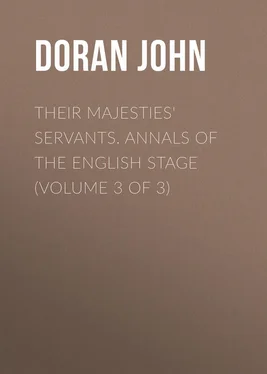John Doran - Their Majesties' Servants. Annals of the English Stage (Volume 3 of 3)
Здесь есть возможность читать онлайн «John Doran - Their Majesties' Servants. Annals of the English Stage (Volume 3 of 3)» — ознакомительный отрывок электронной книги совершенно бесплатно, а после прочтения отрывка купить полную версию. В некоторых случаях можно слушать аудио, скачать через торрент в формате fb2 и присутствует краткое содержание. Издательство: Иностранный паблик, Жанр: foreign_antique, foreign_prose, на английском языке. Описание произведения, (предисловие) а так же отзывы посетителей доступны на портале библиотеки ЛибКат.
- Название:Their Majesties' Servants. Annals of the English Stage (Volume 3 of 3)
- Автор:
- Издательство:Иностранный паблик
- Жанр:
- Год:неизвестен
- ISBN:нет данных
- Рейтинг книги:3 / 5. Голосов: 1
-
Избранное:Добавить в избранное
- Отзывы:
-
Ваша оценка:
- 60
- 1
- 2
- 3
- 4
- 5
Their Majesties' Servants. Annals of the English Stage (Volume 3 of 3): краткое содержание, описание и аннотация
Предлагаем к чтению аннотацию, описание, краткое содержание или предисловие (зависит от того, что написал сам автор книги «Their Majesties' Servants. Annals of the English Stage (Volume 3 of 3)»). Если вы не нашли необходимую информацию о книге — напишите в комментариях, мы постараемся отыскать её.
Their Majesties' Servants. Annals of the English Stage (Volume 3 of 3) — читать онлайн ознакомительный отрывок
Ниже представлен текст книги, разбитый по страницам. Система сохранения места последней прочитанной страницы, позволяет с удобством читать онлайн бесплатно книгу «Their Majesties' Servants. Annals of the English Stage (Volume 3 of 3)», без необходимости каждый раз заново искать на чём Вы остановились. Поставьте закладку, и сможете в любой момент перейти на страницу, на которой закончили чтение.
Интервал:
Закладка:
Before we leave these august personages, let us take one glance at them, as they sit among the audience, "in State." 7 7 See the London Chronicle , 9th October 1783, for the account of this visit.
When their Majesties, with the Prince of Wales, the Princess Royal, and the Princess Augusta, went thus, in state , on October 8, 1783, to see Mrs. Siddons play Isabella, there was much quaint grandeur employed to do them honour. The sovereign and his wife sat under a dome covered with crimson velvet and gold; the heir to the throne sat under another of blue velvet and silver; and the young ladies under a third of blue satin and silver fringe. My readers may desire to know how royalty was attired when it went to the play in state some fourscore years ago. There was some singularity about it. George III. wore "a plain suit of Quaker-coloured clothes with gold buttons. The Queen a white satin robe, with a head-dress which was ornamented by a great number of diamonds. The Princess Royal was dressed in a white and blue figured silk, and Princess Augusta in a rose-coloured and white silk of the same pattern as her sister's, having both their head-dresses richly ornamented with diamonds. His Royal Highness the Prince of Wales had a suit of dark blue Geneva velvet, richly trimmed with gold lace." The handsome young fellow, as he was then, must have looked superbly, and in strong contrast with his sire, – King in Quaker-coloured suit, and Prince in blue Genoa velvet.
George III. was not always lucky in his Thursday-night commands, and people laughed, when, after the solemn funeral of his uncle, the Duke of Cumberland, he ordered "Much Ado about Nothing" to be played in his presence. For Shakspeare he had less regard than his father. Prince Frederick once suggested that the whole of Shakspeare's plays should be represented, under his patronage – at the rate of a play a week, but difficulties supervened, and the suggestion made no progress.
Let us turn from these royal to less noble folk. We find, on a July night of 1761, Mr. Walpole at Drury Lane, to witness the performance of Bentley's "Wishes." He has left a pleasant sketch of the audience-side of the house, whither he went "actually feeling for Mr. Bentley, and full of the emotions he must be suffering." But – "what do you think in a house crowded was the first thing I saw? Mr. and Madame Bentley perched up in the front boxes, and acting audience at his own play! No, all the impudences of false patriotism never came up to it! Did one ever hear of an author who had courage to see his own first night in public! I don't believe Fielding or Foote himself ever did. And this was the modest, bashful Mr. Bentley, that died at the thought of being known for an author, even by his own acquaintance. In the stage-box was Lady Bute, Lord Halifax, and Lord Melcombe. I must say the two last entertained the audience as much as the play. Lord Halifax was prompter, and called out to the actor every minute to speak louder. The other went backwards and forwards behind the scenes, fetched the actors into the box, and was busier than Harlequin. The curious prologue was not spoken, the whole very ill acted. It turned out just what I remembered it; the good parts extremely good, the rest very flat and vulgar; the genteel dialogue, I believe, might be written by Mrs. Hannah. The audience were extremely fair; the first act they bore with patience, though it promised very ill; the second is admirable, and was much applauded; so was the third; the fourth woeful; the beginning of the fifth it seemed expiring, but was revived by a delightful burlesque of the ancient chorus, which was followed by two dismal scenes, at which people yawned, but were awakened on a sudden, by Harlequin's being drawn up to a gibbet, nobody knew why or wherefore, 8 8 Dr. Doran omits "this raised a prodigious and continued hiss, Harlequin all the while suspended in the air."
– at last they were suffered to finish the play, but nobody attended to the conclusion. Modesty and his lady sat all the while with the utmost indifference. I suppose Lord Melcombe had fallen asleep before they came to this scene." The piece was condemned, and the author was the first to recognise the fitness of such a fate. His nephew, Cumberland, sat on one side of him, and when Harlequin was hanged in the sight of the audience, as the fulfilment of the last of the "Three Wishes," Bentley whispered into his complacent kinsman's ear: "If they don't damn this, they deserve to be damned themselves!" The piece lingered for a few nights, and an unsuccessful attempt was made to revive it in 1782. So ended the (not first) experiment of introducing a witty-speaking Harlequin, in place of the dumb hero of pantomime.
At the period when this play was first acted, Garrick and his fellows laboured under a serious disadvantage, when attempting to give full effect to stage illusions, – I allude to the crowding of the stage by a privileged part of the public. In spite of this, Garrick could render perfect and seemingly real, on the same evening, the frantic sorrows of old Lear, and the youthful joyousness of Master Johnny, in the "School Boy." In Dublin, there was often more annoyance than what resulted from mere crowding. Garrick was once playing Lear there, to the Cordelia of Mrs. Woffington, when one Irish gentleman, who was present, actually advanced, put his arm round Cordelia's waist, and thus held her, while she answered with loving words to her father's reproaches. Our sparks never went so far as this, in face of the public, but their intrusion annoyed the great actor. Such annoyance was not felt by his colleagues, and when Garrick resolved once and for ever, in 1762, to keep the public from the stage, there was an outcry on the part of the players, who declared that on benefit nights, when seats and boxes, at advanced prices, were erected on the stage, they should lose the most munificent of their patrons, if these were prohibited from coming behind the curtain. A compromise followed, and Garrick agreed to compensate for driving a part of the audience from the stage, by enlarging the house, and thus affording more room, and the old advantages on benefit nights. Thus, one evil was followed by another, for the larger houses were less favourable to the actor and less profitable to managers, – but stage spectacle became more splendid and effective than ever.
At this time amateur-acting was a fashionable pastime, and it had princely countenance. The Blake Delavals led the taste in this respect at their neat little theatre in Downing Street. The Duke of York, who had distinguished himself early at the Leicester House theatricals, which Quin, I believe, superintended, was a very efficient actor, and he especially merited praise for the grace and spirit with which he played Lothario to the Calista of Lady Stanhope, a Delaval by birth. Admission to these performances was not easily obtained. Walpole did not lack curiosity, but he would not solicit for a ticket, lest he should be refused. "I did not choose," he says, in his comic-jesuitical way, "to have such a silly matter to take ill!"
English and French audiences essentially differed in one pleasant feature, at this time. In France it was not the custom for young unmarried ladies to appear at the great theatres, especially the Opera. As soon as they were married they appeared at the latter in full bridal array, and the plaudits of the house indicated to them the measure of their success. With us, it was otherwise. Ladies, before marriage, appeared at the Opera more frequently than at church; and with much the same feelings, regarding both. "I remember," says Lady M. W. Montague, writing to her daughter, Lady Bute, "to have dressed for St. James's Chapel with the same thoughts your daughters will have at the Opera."
At the latter house, one of the most conspicuous young ladies of her day was Miss Chudleigh, afterwards Duchess of Kingston. She was constantly challenging the attention of the house. On one occasion, when a chorus-singer happened to fall on his face in a fit, Miss Chudleigh drew more notice than sympathy to herself, by pretending to fall into hysterics, and accompanying the pretence with a succession of shrieks and wild laughter. Walpole characteristically ridicules this affectation: "As if she had never seen a man fall on his face before!"
Читать дальшеИнтервал:
Закладка:
Похожие книги на «Their Majesties' Servants. Annals of the English Stage (Volume 3 of 3)»
Представляем Вашему вниманию похожие книги на «Their Majesties' Servants. Annals of the English Stage (Volume 3 of 3)» списком для выбора. Мы отобрали схожую по названию и смыслу литературу в надежде предоставить читателям больше вариантов отыскать новые, интересные, ещё непрочитанные произведения.
Обсуждение, отзывы о книге «Their Majesties' Servants. Annals of the English Stage (Volume 3 of 3)» и просто собственные мнения читателей. Оставьте ваши комментарии, напишите, что Вы думаете о произведении, его смысле или главных героях. Укажите что конкретно понравилось, а что нет, и почему Вы так считаете.












